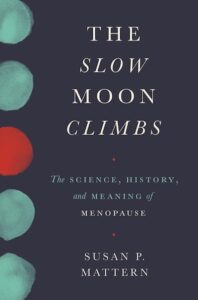 My mother never talked about it, but since being by the side of my beloved wife as she entered and experienced it, I think it’s incumbent upon me – not only as one aspiring to be continually improving my understanding of the histories of natural history, science, and medicine but also, and even more importantly, as one seeking to be a good husband – to learn more about menopause; not only to understand the biological elements of it, but to be able to perceive and better understand its many historical and sociological aspects as well. Prof. Susan Mattern’s The Slow Moon Climbs; The Science History, and Meaning of Menopause is exactly the book I was hoping to find in order to accomplish these goals.
My mother never talked about it, but since being by the side of my beloved wife as she entered and experienced it, I think it’s incumbent upon me – not only as one aspiring to be continually improving my understanding of the histories of natural history, science, and medicine but also, and even more importantly, as one seeking to be a good husband – to learn more about menopause; not only to understand the biological elements of it, but to be able to perceive and better understand its many historical and sociological aspects as well. Prof. Susan Mattern’s The Slow Moon Climbs; The Science History, and Meaning of Menopause is exactly the book I was hoping to find in order to accomplish these goals.
Not only is Prof. Mattern a distinguished research professor – both in what she does but in her very academic title itself – in the department of history at the University of Georgia, her areas of study spanning the histories of Greece, Rome, ancient Egypt, marriage, disease, medicine, women, and law provide her with the necessary breadth of scholarship to undertake such a multi-faceted subject as she does in this remarkable book.
Only recently perceived as a medical condition, the period marking the end of fertility in a woman’s life has for far longer been a sociological phenomenon; a transition into another phase of life and of great significance to the dynamics of the multiple familial and social circles in which the woman lives. I have been particularly taken with Prof. Mattern’s examination of the “Grandmother Hypothesis,” being the importance of elder women in the rearing of future generations (something I have witnessed first-hand by my own mother having lived with my wife, our then young daughter, and myself for fifteen years), as well as her larger discussions of the status of older people in societies – both past and present.
Available from:
If you enjoyed reading this, please consider signing up for The Well-read Naturalist's newsletter. You'll receive a helpful list of recently published reviews, short essays, and notes about books in your e-mail inbox once each fortnight.

